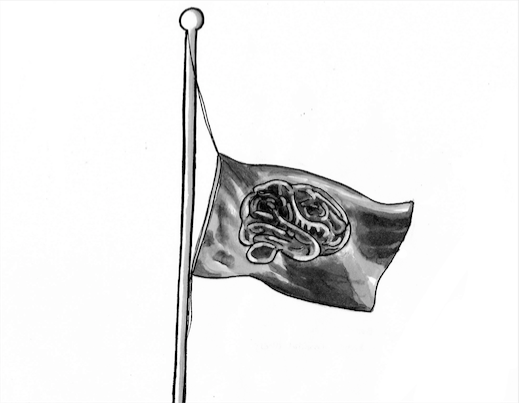Illustration by Tanya Bearson
On Valentine’s Day of 2018, seventeen students and teachers at Marjory Stoneman Douglas High School were killed and more were injured when a former student opened fire. This wasn’t the first mass or school shooting to occur in just 2018, and it hasn’t been the last. In the past few years in particular, shootings and gun violence have become a new normal for children and adults alike, including students and teachers at
Berkeley High School (BHS). As gun violence has risen to the forefront of people’s minds, one response is to consider the role mental illness might play in these tragedies. In many cases, some people feel that when mental illness is connected to shootings, it creates unfair treatment towards those who have mental illnesses. Ava Remler, a junior at BHS, said, “In relation to shootings, talking about mental illness is a very slippery slope and does create a lot of unnecessary stigma. I have a lot of people in my life who are mentally ill and often this is used as justification to strip them of their second amendment rights.”
Many believe that for someone to be able to commit an atrocity as horrible as a shooting, it goes well beyond mental illness. “I think there are different levels of things going on internally, that can be brought on by different things both internally and externally,” said BHS senior Sean Hoffman. He explained, “For instance, not every shooter is a born psychopath. There are students and others who go through bullying, abuse, stress, and depression, which can cause people to snap.”
Roni Weissman and Maren Frye, leaders of the BHS Gun Safety Club and BIHS juniors, mentioned that one study done in 2016 found that only around one percent of mass shootings and homicides by guns were by people suffering from mental illness. “So essentially the correlation many people claim between mental illness and gun violence is completely overblown,” said Weissman and Frye.
Students are afraid that classifying mass shootings as a result of mental illness could impede actions that could prevent future incidents. “Often, I feel that when people say that someone who committed a shooting had some sort of mental illness is like saying that they were an exception, and that we don’t have to discuss or talk about it,” said Sofie Maurer, sophomore at BHS. Much of the controversy of talking about mental illness in connection to gun violence comes in the form of what can seem as a debate between gun violence prevention by better mental health care or less access to guns. According to Weissman and Frye, “We don’t think it should be an either-or situation. While mental health care should definitely be addressed, we don’t think the right place to do so is within the gun debate.” Hoffman feels that mental illness could still have a place in the conversations and legal actions to prevent gun violence. “Both guns and mental health problems are part of the root of gun violence, and it is best to solve problems like these by approaching from multiple — if not all — angles,” said Hoffman. One way to consider mental illness is through background checks.
To Remler, considering severe mental illness is important when creating background checks, no matter how much mental health care can improve, decisions have to be made about when people with severe mental illness can or cannot buy a gun. “Staying on the safe side is my preference, living in a world where we can’t expect to all out ban guns or can’t expect to correct all severe mental illness,” said Remler.


